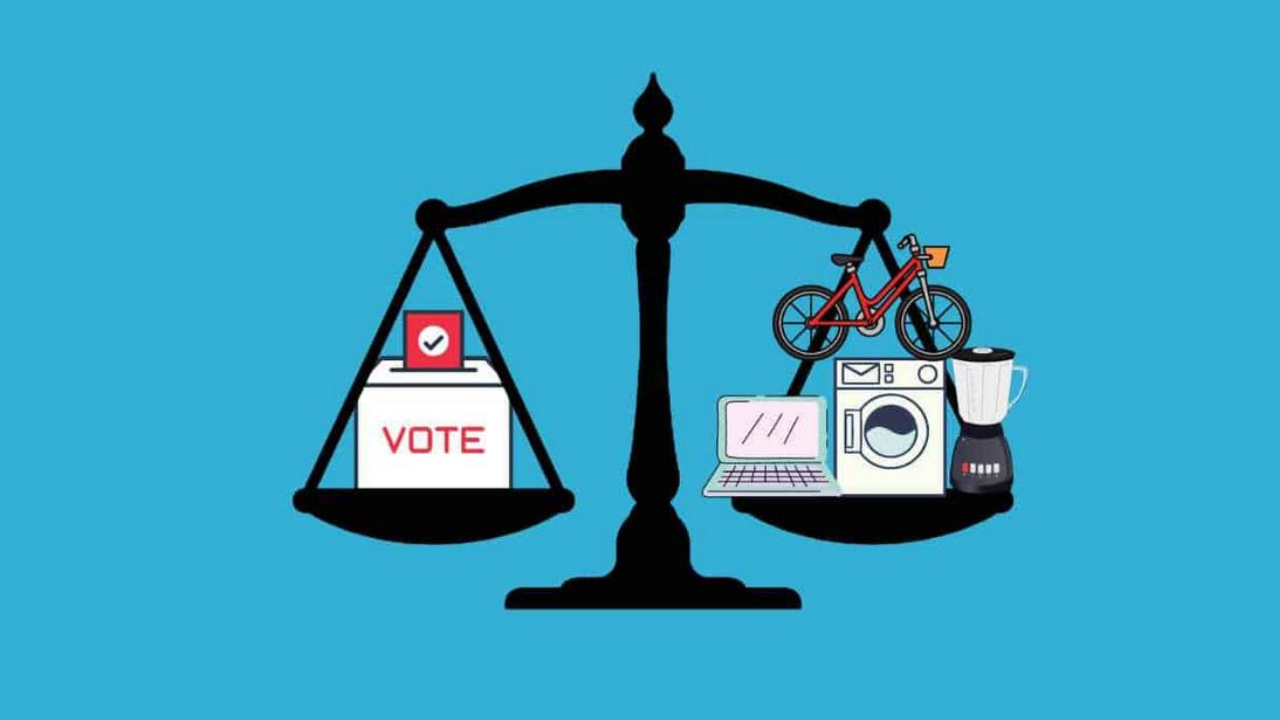NEW DELHI
In the lead-up to the Assembly elections in the five states, all major political parties have been engaged in a competitive game of welfare politics, showering voters with promises of freebies. However, experts warn that these handouts and payouts could have dire economic consequences due to the additional financial burden they place on the state treasury.
The election results on Sunday, in a sense, mark the beginning of the countdown for the new governments to fulfil the promises made in manifestos of their parties. Voters in the Hindi heartland and states like Telangana have exhibited a seemingly insatiable appetite for freebies, and the Election Commission of India (ECI) has noted a sevenfold increase in election-related freebies.
Economists like Ashima Goyal, a member of the Reserve Bank of India’s Monetary Policy Committee (MPC), and Infosys co-founder N.R. Narayana Murthy have expressed concern over the rampant distribution of freebies, emphasising their potential to disrupt fiscal discipline and hinder sustainable economic growth.
In states like Madhya Pradesh, Rajasthan and Chhattisgarh the welfare schemes and financial assistance for women, jobless youth, farmers, students and the elderly could cost between Rs 80,000 crore to Rs 1.5 lakh crore to each state government, say experts.
Free electricity, travel, free pilgrimage, subsidised cooking gas, high MSP for farm produce and many other schemes would exert pressure on the finances of the states whose revenue or source of income is limited. There is also the possibility of the states’ borrowing shooting up.
The impact of offering freebies on states’ financial health can be gauged from what Punjab, Himachal Pradesh and Karnataka—which went to elections in the previous rounds—have gone through over the years. The outstanding debt of Punjab as on 31 March 2022 was Rs 60,150 crore (47.41% debt-to-GSDP ratio); Himachal Pradesh had an outstanding debt of Rs 19,426 crore (50.20% debt-to-GSDP ratio) and Karnataka had an outstanding debt of Rs 67,142 crore (38.19% debt-to-GSDP ratio). At least a part of the financial load on these states is linked to the freebies that the governments in the states had to give to fulfil the poll promises.
Analysts caution that implementation of poll promises is not going to be instant or the schemes will have to wait until April 2024 when the new financial year begins. “The new government will first have to make budgetary provision for the expenditure on these schemes for which it will have to present a budget,” said political analyst Ritwick Srivastav.
“Additionally, many poll promises would be implemented with caveats,” he said, hinting at possibility of introduction of schemes in a graded form to avoid the burden of covering the entire population in one stroke.
A BJP national spokesman said, “Ours is the only party which makes only those promises during elections that can really be implemented within the limited space of financial discipline.”
He also cited Prime Minister Narendra Modi’s guarantees and national president J.P. Nadda’s assertion that the party creates a committee in each state to monitor the progress on implementation of its poll promises.
Congress spokesman Deepak Jha said the party’s new state governments after the declaration of election results on Sunday would have no problems in fulfilling their promises on welfare schemes.
“This term freebie has been coined by rivals to mislead people. Nothing is going to be free. Our governments will plug the leakages in public spending and channel the saved money for implementing the poll promises,” said Jha.
Rajasthan and Madhya Pradesh have the highest debt-to-GSDP ratios among the four big states which went to election last month, at 35.5% and 35.2%, respectively. This means that Rajasthan’s and Madhya Pradesh’s debts are equivalent to nearly 36% and 35% of their annual economic outputs, respectively. Chhattisgarh’s debt-to-GSDP ratio is lower at 27.1%. Telangana’s debt-to-GSDP ratio is the lowest among the four states at 29.4%, but it is still above the 20% threshold considered sustainable by the International Monetary Fund (IMF).
Experts say the high debt levels of these states are a cause for concern as they can limit their ability to invest in infrastructure and social welfare programmes. They can also make it more difficult for the states to repay their debts, which could lead to a financial crisis.
Expressing concern over freebie politics, Ashima Goyal, a member of the Reserve Bank of India’s Monetary Policy Committee (MPC), recently said the Election Commission body should make it mandatory for political parties to give an estimate of the freebies offered to the voters ahead of elections.
Co-founder of Infosys N.R. Narayana Murthy believes that citizens should not be given any service or subsidy for free. He believes beneficiaries of such schemes should be made to commit something that helps in social development. He cited the example of keeping conditions—like a minimum attendance of 20% in schools—before offering a freebie like free electricity to the community.

